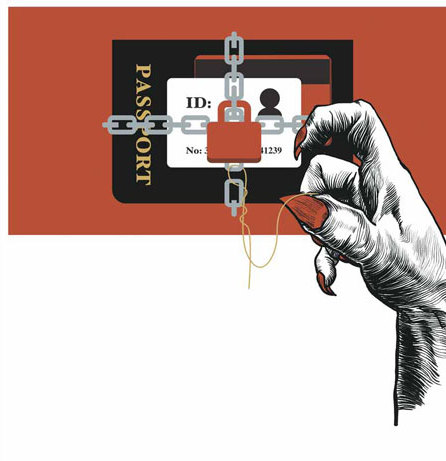They've got your number
Updated: 2013-05-30 08:08
By Hu Yongqi (China Daily)
|
||||||||
|
Ma Xuejing / China Daily |

The theft and sale of personal information taken from the Internet and mobile devices has prompted calls for tougher laws, as Hu Yongqi reports from Beijing.
Sun Feng was woken by a phone call at 3 am. Although he had been roused from a deep sleep, Sun did his best to answer politely because he thought it might be an emergency call from a friend. However, all he heard was some women and children screaming in scary "ghost voices". "Go to hell," he told them angrily and cast the receiver aside.
Sun, distressed to receive the same prank call for the next four nights, eventually became so angry that he called the police. However, upon inquiry the number proved to be invalid and unreachable.
"I rarely leave my phone number with strangers. However, I did when I registered on a shopping website last month," said the 27-year-old law firm employee from Beijing's Chaoyang district. He wondered if the number might have been disclosed during the registration process.
To prevent the irritating calls, Sun installed an intelligent interception application on his smartphone. However, because the terms of the contract he signed authorized the service provider to access his contacts and other information in the phone, he received even more calls.
In the week that followed, Sun received a dozen "cold calls" every day from real estate developers and insurance companies. "It was very annoying to get calls from people I didn't know, and didn't want to know, because I had no need of their products," Sun said.
So far, he has been unable to discover the identities of his malicious harassers, but one thing is certain - his personal information is no longer private. According to Beijing Times, a dozen residents in the capital also received the same late-night call and felt powerless to stop it.
The sale of personal information is an important source of revenue for some "brokers", according to experts. Last year, 31 people suspected of illegally trading personal information were arrested in Shanghai. Since February 2012, the Ministry of Public Security has held three nationwide campaigns to crack down on the illegal trade, arresting 500 brokers in the process.
"The crime of selling private information is like a pyramid - some industry insiders illegally sell information to brokers, who establish a platform for the next buyers. With this data, suspects unlawfully make money by pushing the information on to a higher level at a higher price," said Liu Ancheng, director of the criminal investigation department of the Ministry of Public Security, quoted by Xinhua News Agency.
Experts said the adoption of legislation on personal information protection must be accelerated to prevent a further deterioration in security.
Database storage
Zheng Peng, a 39-year-old bank employee in Beijing, was frustrated at having to answer at least 10 cold calls every day. He was desperate to change his mobile number, but given the inconvenience of contacting hundreds of business and personal contacts and alerting them to the change of number, he decided to abandon the idea.
He remembered that he had registered with several real estate agencies a few months ago, as he was looking to sell his apartment and move to a new place. "In the last three months, I have not left my mobile number or other personal information with any companies," he said.
"All the information about buyers and sellers is stored in a database, so agents can trace the clients and call them back," said a real estate agent in Beijing, who asked to be known simply as "Wang".
Wang said agents are required to record the demands and preferences of potential clients they speak to by phone. This enables agents to find apartments suited to the demands of specific customers. "Every time an agent calls a client, a large number of details are entered on the agency's database, so agents will have clearer picture of the customer's needs," he said.
Wang revealed that his fellow agents are required to call at least 10 people each day and take 10 to view the apartments on sale. Otherwise, the agents will be fined 10 yuan ($1.58) to 50 yuan, he said.
"For various reasons, a client might not follow up on promises to view apartments. If the agent thinks the person is not worth following up, they will usually pass the client's number to colleagues," Wang said.
Wang said personal information, such as mobile numbers, is a good means of making extra money. "I can either sell an apartment to the client myself, or share a cut of the proceeds if I give a number to a colleague who then sells an apartment to the client," he said.
Personal information disclosure has now spread from the physical world to cyberspace. In 2011, the Chinese Software Developer Net, the biggest online IT forum for Chinese users, was hacked, resulting in 6 million usernames and passwords being exposed to netizens.
Gathering information is a highly secretive process and it's hard to detect those making use of private information on and off the Internet, said Zhou Qingshan, deputy dean of the information management department at Peking University.
In March 2012, Shanghai police cracked down the online trade of private information about drivers, students and businesses. Each bundle of information could earn the brokers 90 to 100 yuan, according to local media reports.
Currently, many Internet users submit a host of private information online when they register for accounts, but they may not realize how that information is used, said Zhou Hanhua, a researcher at the law institute of the Chinese Academy of Social Sciences.
"Collecting user data and selling the information to a third party can bring great rewards to businesses. That's why many online operators and Internet company employees still secretly collect data," said Zhou.
Legislation urged
The complexity of collecting evidence and proving that it has been used illegally makes the task of defending people's privacy almost impossible. A survey conducted by China Youth Daily in 2012 showed that more than 30 percent of complainants gave up on attempting to claim their rights concerning personal details because of the high costs and the inconvenience of the process. "To some extent, the punishment for violators and the difficulties of fighting fraudsters has lowered confidence in the individual's ability to protect their personal data," said Professor Zhou Qingshan.
Now there are several articles in at least three laws and regulations to govern personal information protection, but the collection of personal data is still reliant on industry self-discipline, said Xie Shoufen, law professor at Fudan University in Shanghai.
In a previous interview with China Daily, CASS researcher Zhou said there is an urgent need to enact laws to protect personal information and impose serious penalties on those who invade Internet privacy. "We only have a legal framework and some basic principles, but they are all difficult to enforce and don't threaten those who engage in this sort of enterprise," he said.
He added that some personal details held on particular websites, such as those run by medical centers, banks and media companies, have been leaked, and what the public knows about the problem might be only the tip of the iceberg.
Peking University's Zhou Qingshan said individuals must be aware of the type of information that can be safely left with a third party or registered online and what cannot. "The protection of personal information has to be achieved through cooperation between the government, legislators and the relevant businesses. The most efficient way of solving the problem of personal data disclosure is to enact clear laws that carry firm punishments," he said.
Experts also said transparent lines of supervision are a necessity to prevent any possible infringements of individual rights.
A draft law on the protection of personal information was completed in 2008, but is still being modified by the legislators. Although the country's top legislature, the National People's Congress, published a proposal on improving the protection of personal information at the end of 2012, no time scale for implementation has yet been unveiled.
"Only if all parties involved do their best to guard private data closely will personal information be safe and people's lives left undisturbed," said Liu Fawang, deputy director of the China Software Testing Center.
Contact the writer at huyongqi@chinadaily.com.cn
Tang Yue and Cao Yin contributed to this story.
|
Receiving 'cold calls' or texts from real estate developers and insurance companies is an everyday occurrence for some Chinese people. Kuang Linhua / China Daily |
(China Daily USA 05/30/2013 page8)

 Michelle lays roses at site along Berlin Wall
Michelle lays roses at site along Berlin Wall
 Historic space lecture in Tiangong-1 commences
Historic space lecture in Tiangong-1 commences
 'Sopranos' Star James Gandolfini dead at 51
'Sopranos' Star James Gandolfini dead at 51
 UN: Number of refugees hits 18-year high
UN: Number of refugees hits 18-year high
 Slide: Jet exercises from aircraft carrier
Slide: Jet exercises from aircraft carrier
 Talks establish fishery hotline
Talks establish fishery hotline
 Foreign buyers eye Chinese drones
Foreign buyers eye Chinese drones
 UN chief hails China's peacekeepers
UN chief hails China's peacekeepers
Most Viewed
Editor's Picks

|

|

|

|

|

|
Today's Top News
Shenzhou X astronaut gives lecture today
US told to reassess duties on Chinese paper
Chinese seek greater share of satellite market
Russia rejects Obama's nuke cut proposal
US immigration bill sees Senate breakthrough
Brazilian cities revoke fare hikes
Moody's warns on China's local govt debt
Air quality in major cities drops in May
US Weekly

|

|









